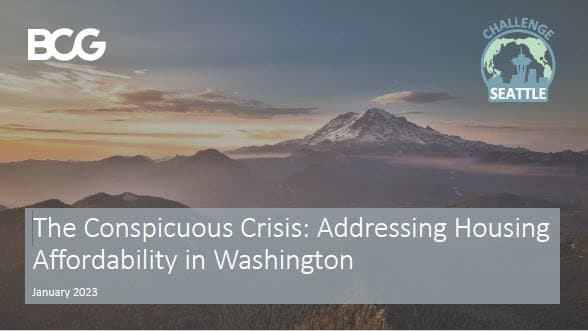Published on:
Action is needed now to address housing affordability in Washington and the worsening problem of inadequate supply.
“Action should begin with zoning reform as the foundation to build upon. From there, a comprehensive portfolio of short- and long-term policy solutions is required to fully address the crisis,” a new report states.

Those were among the takeaways from a 125-page report Challenge Seattle released last month. The business alliance hired Boston Consulting Group to outline the scope of the challenge, analyze best practices, and identify policies and actions that should be considered. The report, titled “The Conspicuous Crisis: Addressing Housing Affordability in Washington,” follows a 2019 study, also by BCG, that focused on King County.
In the new report, the scope is statewide. The document includes a map depicting the percentage of households in each county that spend more than 30% of their income on housing, thereby being cost-burdened.
Researchers found nearly 1 million households are cost burdened. Across the state 60% of low-income and 23% of middle-income households are burdened by housing costs – and, the report notes, unaffordability disproportionately impacts people of color.
Calling the housing affordability challenge “massive” and noting projected growth in the state’s population, the report’s authors say the crisis “will inevitably worsen with inaction,” adding there are no easy answers and no single solution. It also emphasizes housing affordability has broad societal and economic effects for the state and our communities.
Washington will need between 588,000 and 2.1 million net new homes by 2050, according to the Housing for All Planning Tool from the state’s Department of Commerce. That’s equal to 20,000 to 71,000 new housing units each year over the next 30 years. Decades of underbuilding are blamed for much of the shortfall.
To meet demand and ensure affordability across the household income spectrum, new units must be of the right size, at the right price, and in the right places, according to the report.
The report cites various, recently implemented initiatives since the 2019 report. Although it is too early to definitively state their impact on housing affordability, Challenge Seattle concludes these initiatives alone are not sufficient to address the issue.
BCG’s research uncovered more than 50 housing policies and actions that have shown promise in increasing housing supply and improving affordability. Each item was graded based on potential impact and feasibility in Washington. Also considered were equity and climate impacts.
The analysis by BCG resulted in a list of 19 recommended approaches, including 15 long-term policies and actions that would produce “a structural change to increase housing supply,” plus four near-term policies and actions that would support distressed Washington households now. The full report contains a detailed description and evaluation of each policy.
Among the recommendations, BCG says cross-sector (public, nonprofit, private) cooperation is critical and a comprehensive portfolio is required to address the crisis. As part of the portfolio, best practices from six locations were assessed to understand how policies and actions are working in practice. In addition to select cities in Washington, the locations included California; Charlotte, North Carolina; Massachusetts; Chicago; and Singapore.
More companies need to help finance and build affordable housing as part of the solution to the housing crisis, according to the report, which acknowledges considerable contributions already made by Amazon and Microsoft. (Microsoft is a member of Challenge Seattle.) “Large private companies based in areas with high housing costs have an interest in their workforce’s housing availability and costs, and therefore have a strong reason to be part of the solution,” it states.
Challenge Seattle is a coalition of business and tech leaders. Led by former Washington State Governor Christine Gregoire, the alliance consists of CEOs from 21 of the region’s largest employers who collectively tackle some of the region’s most pressing civic challenges. Its areas of focus include the Cascadia Innovation Corridor, education, employers for racial equity and regional infrastructure.